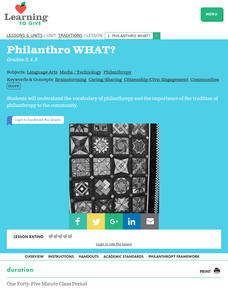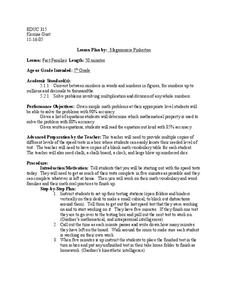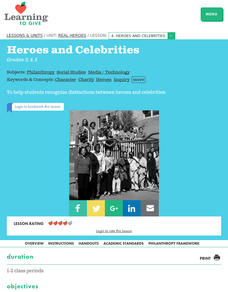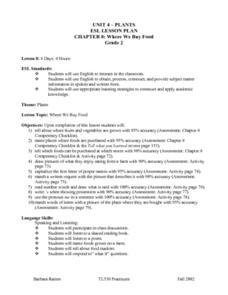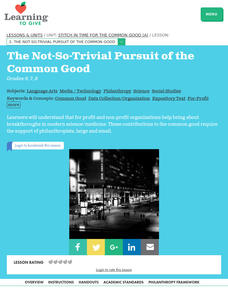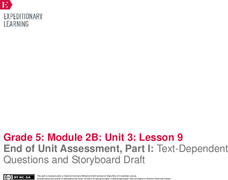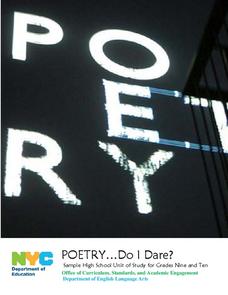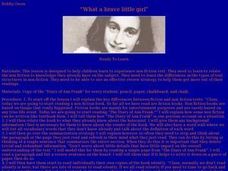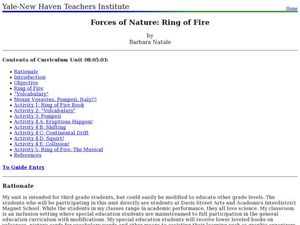Curated OER
Philanthro What?
Young scholars discuss what it means to be a philanthropist and how important philanthropists are to the community. They discuss the tradition involved in philanthropy and create a show and tell "Philanthropy Teaching Quilt" using the...
Curated OER
The Big City
Young scholars explore structures in a big city. In this big city lesson, students become familiar with vocabulary about big cities through songs graphs, and hands-on art. Young scholars practice phonic sound /M/.
Curated OER
Partial Products
Students use the partial products algorithm to complete multiplication problems. In this partial products lesson plan, students are introduced to the algorithm and connect the relationship to multiplication and division problems.
Curated OER
What Are You Doing?
Students use current time indicators while learning to talk about on-going action. In these vocabulary lessons, students works with power point presentations, games, flashcards, worksheets and video slides.
Curated OER
Fact Families
Fifth graders explore fact families. They solve simple math problems. Students determine which mathematical property is used to solve the given problem. They are given five minutes to complete as many mathematical facts as possible.
Curated OER
Hereos and Celebrities
Students complete a vocabulary game using new words. They use a Venn diagram to distinguish between a celebrity and a hero. They take a vocabulary quiz to complete the lesson.
Curated OER
The Earth
Third graders examine the relationship between the Earth and the Sun. They define key vocabulary terms, and in small groups conduct Internet research, exploring a variety of websites. Students answer comprehension questions, and...
Curated OER
Problem Solving in Mathematics
Seventh graders discover that there are multiple strategies to be used in problem solving. They explain a problem solving situation in their own words and determine a possible strategy for solving the problem.
Curated OER
Where We Buy Food
Second graders investigate how to buy food by going to the store. They use pictures of farming and different types of food to engage in the lesson. It includes key vocabulary that puppets use while telling a story to the students. They...
Curated OER
The Not-So-Trivial Pursuit of the Common Good
Learners practice using vocabulary associated with philantrophy. They identify scientific breakthroughs and the funding that made it possible. They create and explain timelines of scientific and medical breakthroughs.
EngageNY
Building Background Knowledge: Jigsaw to Build and Share Expertise about the 2010 Haiti Earthquake, Part 2
Calling all experts! Using the educational resource, pupils work together in small expert groups, reading an article about the 2010 Haiti earthquake. As they read, they record two main ideas and supporting details from the text.
EngageNY
Researching about the Red Cross, Continued: Who Is the Red Cross and What Does This Multinational Organization Do?
Code red! Learners read an informational article about the Red Cross, discussing the gist of the text in small groups. On a three-column note catcher, pupils take notes to show how the Red Cross functions as a multinational aid...
EngageNY
End of Unit Assessment, Part 1: Text-Dependent Questions and Storyboard Draft: “You Can Do a Graphic Novel” Excerpt
Eyes on the finish line. Serving as the first part of the end of unit assessment, learners answer questions based on a text about how to write a graphic novel. Using what they've learned, they then create a storyboard about the invention...
Curated OER
Rules for Rubrics
How do you create an effective and fair rubric? Read this article to create the best rubric possible.
New York City Department of Education
Poetry…Do I Dare?
Whether you're considering a poetry unit or just want to incorporate more poetry in your curriculum, this unit plan is a must-have. Packed with poems, teaching points, powerful prompts, and poetry performance suggestions, the resource is...
New York City Department of Education
Egypt
This six-week unit encompasses all subjects with a focus study on world history and the development of ancient civilizations. As gifted and talented students dive into the interesting yet challenging topic of Egypt, they think critically...
KIPP 3D Academy
Epic Poetry Unit
The Odyssey is the core text in this unit study of the hero's journey motif. Along the way, kids research Greek and Roman history, mythology, art, and epic poetry. The 104-page packet is perfect for homeschool or classroom situations and...
Evan-Moor
Daily Handwriting Practice: Traditional Cursive
Keep your class practicing handwriting each day in a 36-week school year with this comprehensive resource that combines daily cursive practice with content such as poetry, geography facts, continents, and much more.
Curated OER
What a Brave Little Girl
Young scholars practice relating non-fiction to knowledge they already have on the subject. They evaluate differences in the types of text structrures in non-fiction. They employ a review strategy that allows them to understand their...
Curated OER
I am Special and You are Special Too #9
Eighth graders will explore the rhythm and rhyme of poems to understand the basic elements of poetry. In this poetry and literary lesson, 8th graders relate their love for rap music to poetry. Students will discuss several different...
Achieve3000
Context Clues and Idioms
Kids practice using five types of context clues (definition, synonym, antonym, example, and general) to decode idiomatic language.
Curated OER
Forces of Nature: Ring of Fire
Third graders will research the Ring of Fire and be able to share their findings with their partner. They will also demonstrate volcanic eruptions using a baking soda and vinegar volcano model. Then they will discover how continental...
Pearson
Unlocking and Exploring Folktales
Designed with many of the Common Core standards in mind, this 10-lesson unit is brimming with ELL strategies, teacher's notes, and the best of core instructional methods for teaching the common elements of folktales, and exploring...
College Board
Evaluating Sources: How Credible Are They?
How can learners evaluate research sources for authority, accuracy, and credibility? By completing readings, discussions, and graphic organizers, scholars learn how to properly evaluate sources to find credible information. Additionally,...


